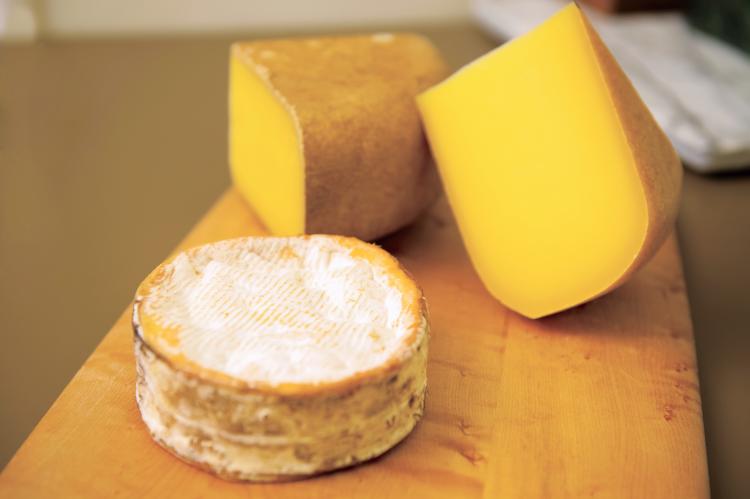Home > Wisconsin > Wisconsin Farm to Table > Wisconsin Cheesemakers Are Finding their Whey
Wisconsin Cheesemakers Are Finding their Whey
In partnership with: Wisconsin Department of Agriculture, Trade and Consumer Protection.
Marieke Penterman and her staff from Holland’s Family Cheese in Thorp make it a point to volunteer at the U.S. Cheese Championships, if only to be in the room to watch the look on the judges’ faces when they sample variations of the company’s cow’s milk gouda – some fresh, some aged, some flavored with fenugreek, smoked cumin or honey clover.
And if the judges were especially hard to read in 2013, it’s because they were likely stifling a smile. The company’s mature gouda – “Marieke” – was named the country’s 2013 championship cheese, besting more than 1,700 other entries from 30 states.
A native of the Netherlands and a cheesemaker since 2006, Penterman represents a new – and growing – breed of Wisconsin artisan, evolving the the state’s storied tradition by handcrafting new varieties with a combination of old-world techniques and new-world innovation.
Specialty cheeses now make up roughly a fifth of cheese produced, by pound, in the state, up from the single digits in the 1980s, says John Lucey, director of the Center for Dairy Research at the University of Wisconsin-Madison. In all, the state’s 1,200 licensed cheesemakers produce some 600 types of cheese with aged Gouda and Juustoleipa, a cheese toasted during preparation, among the up-and-coming varieties. Asingle company from Monroe, Chalet, produces all the surface-ripened Limburger made in the United States.
Penterman says she didn’t start out to make cheese but was drawn to the U.S. by affordable farmland and the dream of raising cows. The cheese business evolved from a subsequent apprenticeship with two Dutch farmers and the development of a production method that combines a Dutch process of curing cheese on pine planks with the milk from her 850 Wisconsin cows – and from Penterman’s own cravings for a quality Gouda.
“We get our milk from the farm on site, and within five hours after it’s left the cows, we’re making it into cheese.”
In addition to Marieke’s overall win, Wisconsin cheese makers won gold medals in 47 of 81 categories judged, besting the six gold medals each won by cheesemakers from Vermont and New York.
Wisconsin cheese success is not a new phenomenon – the state’s first dairy school opened back in 1890, and over the years, immigrants combined techniques brought from cheese making powerhouses like Switzerland, Germany and Italy with Wisconsin’s high-quality milk, Lucey says. The industry further evolved through the state’s Master Cheesemaker program, launched in 1994 as a partnership between the university and Wisconsin Milk Marketing Board and still the only one of its kind outside of Europe.
Licensed cheesemakers with at least 10 years of experience can apply to the elite program requiring a three-year commitment to classes, inspections and more. Among the program’s 56 graduates are brothers Ron, Steve and Dave Buholzer of the Klondike Cheese Company in Monroe. Grandsons of a Swiss cheesemaker, the three are now masters in Feta, one also in Brick and two in Muenster. Dave, who won a recent gold with his Dill Havarti, says the master cheesemaker program helps give an appreciation for the entire process of cheesemaking. It also brought assistance in developing recipes and processes for a new $12 million expansion into the Greek yogurt business.
“These are entrepreneurial people,” Lucey says. “They saw an opportunity in Greek yogurt and invested in it. They went into Feta when nobody else was, and not only that, they made award-winning Feta. These are the kind of people who make the dairy state. They are flexible, they can adapt, and they can still be award-winning.”




